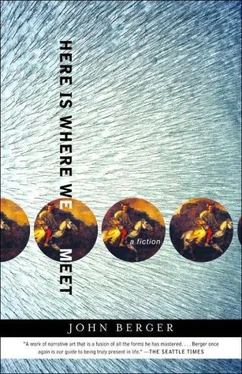It’s what I like best. How on earth did you know? she asks me in her seventeen-year-old voice. Every afternoon I have a Toicino do Céu, she added.
We found a café near the Praça de Luiz de Camões, decorated with blue and white azulejos.
The blue on these tiles, she said, is the same as Reckitt’s Blue. Every little square packet was wrapped in this blue.
I remember turning the wringer to wring the water out of the sheets for you.
After doing the wringing there was water everywhere.
There were mops.
You helped a lot before you went to school.
Before I went to school nothing ever came to an end. Can you guess what the most fabulous object in my childhood was?
You sound like somebody writing an autobiography. Don’t!
Don’t what?
You’re bound to get it wrong.
Do you want to guess what the most fabulous object in my childhood was?
Tell me.
Your barometer!
The one beside Father’s desk? We took it with us whenever we moved. And Father got out his toolbox and screwed it to the wall. I forget how many times. Many, many times. It was a wedding present.
There’s a metal plaque pinned to it which says so.
The Boy Scouts had that plaque engraved specially.
You were married on the sixth of February 1926 and I was born on the fifth of November the same year!
It doesn’t say that! How could they know? Though I knew the very second you were conceived.
I must have been conceived on your wedding night in Paris. That would make exactly nine months!
I loved Paris. Ever since the first time, I’ve loved Paris.
I know.
The pillowcases and the statue of Molière!
Why aren’t you there now, then? You could have chosen Paris.
You can’t live a honeymoon all your life, can you?
No, Maman, but perhaps all your death!
This made her laugh until she had to dab her eyes. It was a silver laugh, like a small jet of water in a decorated urn in the Alhambra.
The barometer is still working, I said.
It was a good make. It’ll last several lifetimes.
Every day you went up to look at it, and you tapped with your knuckles against the glass and you looked at it again and then you announced: It’s going up! Or, the next day: It’s coming down!
Have you ever seen a barometer that stays still?
Yes, in Africa.
We weren’t in Africa, were we?
And do you know what I believed?
She laughed again, jutting her lower lip up towards her nose.
I watched you when you polished and dusted the barometer. Then you tapped it, not once, but three, four, five, six times, and I saw the secret smile on your face and I knew that you had changed what was going to happen! The needle would shift, the prophesy would be altered. It would be closer to FAIR, leaving CHANGE further behind. On other days, if you were anxious and hadn’t received the letter you were waiting for, or didn’t like the book from the public library you were reading, you tapped hard on the glass, and the needle shifted closer to STORMY. And it was never wrong. If it pointed to STORMY, stormy it would be.
So, you believed I was in control?
I did.
I kept a good many things under control, I had to.
Never me!
I never tried with you.
No?
People try to control whatever risks to get out of control, that’s to say what has been controlled before. I left you alone from the beginning.
I felt alone.
To my great surprise, my boy, you were free.
I was scared by one thing after another. I still am.
Naturally. How could it be otherwise? You can either be fearless, or you can be free, you can’t be both.
To know how to be both is surely the aim of all philosophy, Mother.
It’s not philosophy that takes you there.
She started to nibble her favourite flan.
For a few moments love can, she added.
Were you there often?
Once or twice.
When she said this she smiled. The smile accompanying an unsaid password.
You know, don’t you? I said, that after your funeral all of us learnt, to our considerable surprise, that you’d been married and divorced long before you met Father.
Everything comes out in the wash! she said. We loved each other a lot, the first husband and I.
So what made you get divorced?
Because I wanted to have children! She pointed at me with a finger that had custard on it. I didn’t know what either of you would be like, but I wanted children.
And he didn’t?
He and I looked at the stars together. And I wasn’t in a hurry. I was only seventeen. To tell the truth, I was sixteen when I met him — 1909, the year I read Maeterlinck’s The Blue Bird. I met him in the Tate Gallery where I was looking, as on every Sunday, at the Turner watercolours. He invited me to have a cup of tea — there wasn’t much coffee in those days — and he told me all about Turner’s double life as an old man. I thought he was an old man — though he was only half as old as you are today. And I remember wondering whether he had a double life too. The next Sunday he told me the story of Miriam.
You mean the Bible story?
He told me both. The Bible story and my story. And do you know something? He was the first person ever to call me Miriam! At home I’d always been Mim. I left the stables and the warehouse horses my father looked after and I was Mim. I walked across Vauxhall Bridge, and on the other side of the Thames where he greeted me, I was suddenly Miriam.
You married him when?
He’d come back from India, and I thought that if I married him, it would be a way of keeping him. I kept him for nine years; for nine years he was happy with his Miriam.
He didn’t work?
He wondered about things, he asked questions. And I learnt and I read so I could talk with him. Sometimes we talked all night. He’d wake me up and take me out into the garden, we had a big garden, and at the bottom of it was a bust of Seneca, and nobody could see us and we’d stand there like Adam and Eve watching the sun come up.
Like Adam and Eve?
Naked.
The house was where?
Croydon.
Croydon! I shouted in surprise.
Shh! Don’t shout, people will look at us; people don’t shout in this city. I still remember the words I learnt by heart sitting under that statue: ’You must want nothing, if you wish to challenge Jupiter who himself wants nothing!’
But by now you wanted children and Jupiter didn’t!
Don’t be vulgar. Alfred worshipped me. Do you understand? He made me feel very beautiful. Your father was a more manly man; Charles worshipped me from afar.
Did Father meet him?
After the divorce he left his house and became a tramp.
That must have been hard on you.
It was what he wanted.
You went on seeing him?
I see him still. Like I’m seeing you now.
He’s here in Lisboa?
If ever a man should go straight to heaven, it would be Alfred. He was a saint. Saints are not easy to live with. But saint he was. He’s not in Lisboa.
I think I saw him once.
You couldn’t have!
One day in Croydon you left me in a big store.
Kennards!
You left me in Kennards’ toy department.
You loved watching the trains. The new electric trains, not the clockwork.
You took me to the toy department and you said: Wait here, John, I won’t be gone long. I waited. The trains seemed to go slower and slower. I wasn’t worried, but it was a long while. I watched the signals change colour a thousand times. When you came back you looked very flushed, as if you’d been running. We took the lift straight down to the ground floor. Outside, behind the store, in a back street, a man stood on the pavement blocking our way, and you put your handkerchief up to your face. His clothes were held together with string. He had a straggling beard. And his expression! I couldn’t take my eyes off his face.
Читать дальше












